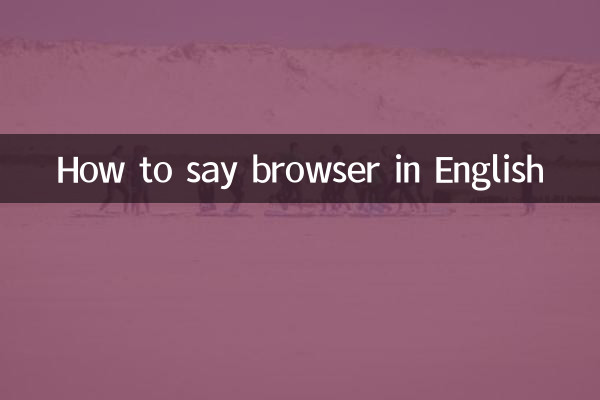How to say browser in English
In the Internet era, browsers are an indispensable tool for our daily Internet access. Whether it is work, study or entertainment, we cannot do without the browser. So, how do you say the browser in English? The answer is"browser". The word comes from the verb "browse," which means "to browse," while "browser" refers to a software tool used to browse web pages or files.
The following is a summary of hot topics and hot content across the Internet in the past 10 days to help everyone understand the current hot trends.

| hot topics | heat index | Main discussion platform |
|---|---|---|
| The latest progress of artificial intelligence ChatGPT | 9.5/10 | Twitter, Reddit, Zhihu |
| Highlights from the FIFA World Cup | 9.2/10 | Weibo, Douyin, YouTube |
| Extreme weather events from global climate change | 8.8/10 | News sites, Twitter, Facebook |
| New applications of metaverse and virtual reality technology | 8.5/10 | Technology blogs, LinkedIn, Zhihu |
| The competitive landscape of the electric vehicle market | 8.3/10 | Financial media, Twitter, Reddit |
The history of browser development
Browsers have undergone many major changes since their birth. The earliest browsers date back to 1990WorldWideWeb, developed by Tim Berners-Lee. Then, Netscape Navigator came out in 1994 and became the first widely used browser. In 1995, Microsoft launched Internet Explorer and quickly occupied the market with the advantages of Windows system.
After 2000, Mozilla Firefox and Google Chrome came out one after another, winning a large number of users with their fast, secure and open features. Today, Chrome has become the browser with the highest market share in the world, and browsers such as Firefox, Safari and Edge are also constantly optimizing the user experience.
Browser core functionality
Modern browsers are capable of far beyond simple web browsing. Here are the main features of the browser:
| Function | Description |
|---|---|
| web browsing | The most basic function for loading and displaying web content. |
| Bookmark management | Allow users to save frequently used URLs for quick access. |
| privacy mode | Browse privately without saving browsing history and cookies. |
| Extensions | Users can enhance browser functionality by installing extensions. |
| Multiple tabs | Supports opening multiple web pages at the same time to improve work efficiency. |
How to choose a browser that suits you?
When choosing a browser, you can consider the following aspects:
1.speed: The loading speed of the browser directly affects the user experience. Chrome and Firefox excel in speed.
2.security: The security performance of your browser is crucial. Edge and Safari do a better job of privacy protection.
3.Extended support: If you need to use a large number of plug-ins, the extension libraries of Chrome and Firefox are richer.
4.Cross-platform synchronization: If you use browsers on multiple devices, it will be more convenient to choose a browser that supports synchronization (such as Chrome or Firefox).
Future browser trends
As technology advances, browsers are becoming smarter and more efficient. Here are some possible future trends:
-AI integration: Browsers may have more artificial intelligence features built in, such as smart search, automatic translation, and content recommendations.
-Web3 support: With the development of blockchain technology, browsers may natively support decentralized applications (DApps).
-More lightweight: Future browsers may further optimize resource usage and improve operating efficiency.
No matter how things change in the future, browsers, as the window to the Internet, will continue to play an important role in our digital lives. I hope this article helps you gain a deeper understanding of the browser and its related hot spots.

check the details

check the details